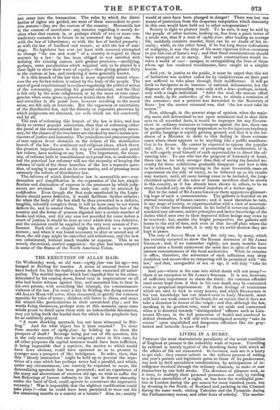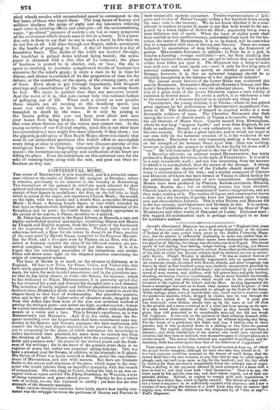LIVING IN A HURRY.
PERHAPS the most characteristic peculiarity of the social condition of England at present is the unhealthy want of repose. Travelling by railroad is merely typical of the headlong hurry with which all the affairs of life are transacted. In business, men are in a hurry to get rich : they cannot submit to the tedious process of adding one year's patient and legitimate gains to those of its predecessor, but seek by bold speculative combinations, by anticipations of in- telligence received through the ordinary channels, to make or mar themselves by one bold stroke. The devotees of pleasure seek, as it were, to multiply their personal presence—not only by rattling to a dozen assemblies of a night, as has been the worshipful prac- tice in London during the gay season for some hundred years, but by shooting in the North of Scotland and yachting in the Channel during the same week, visiting Palestine and the Pyramids during the Parliamentary recess, and other feats of celerity. The mecha-
ideal wheels revolve with accumulated speed to correspond to the liot haste of those who impel them' The long hours of factory and milliner drudges, the gangs of night and day labourers relieving each other in printing-offices and coal-pits--all the unintermitting, eager, " go-ahead" pressure of society— are but so many symptoms of the excitement which impels men to live in a hurry. It is a para- dox only in form to say that we are in such a hurry to live that we do not live at all. Life slips through our fingers, unfelt, unenjoyed, in the bustle of preparing to live. A day of business is a day of breathless haste. The duties of the toilet are hurried through ; the breakfast is gulped down without being tasted ; the news- paper is skimmed with a dim idea of its contents; the place of business is posted to in chariot, cab, or 'bus ; the day is spent in straining to overtake complicated details of business too extensive for the mind's grasp ; it costs a race to be in time for dinner, and dinner is curtailed of its fair proportion of time for the debate, or the committee, or the opera, or the evening party, or all of them. Even sleep is got through impatiently, with frequent startinga and consultations of the watch, lest the morning hours be lost. We snore in quicker time than our ancestors snored. And the worst of it is, that men cannot help this railroad fashion of galloping out of life. When such a crowd as now peoples these islands are all running at this headlong speed, you must run with them, or be borne down and run over and trampled to death by the mass. It is only by joining in the frantic gallop that you can keep your place and save your bones from being broken. Habit becomes so inveterate, that even when thrown out of the vortex men cannot rest. In the young societies of our Colonial empire, (and this is not their least recommendation,) men might live more leisurely if they chose ; but the gigantiejankruptcy of New South Wales shows too clearly that even in our antipodean provinces this foolish effort to accomplish every thing at once is epidemic. Our very diseases partake of this contagious haste : the lingering consumption is growing less fre- quent—the instantaneous apoplexy and ossification of the heart are taking its place. Even the moralizers on this universal race for the sake of running hurry along with the rest, and pant out their re- flections as they run.



























 Previous page
Previous page